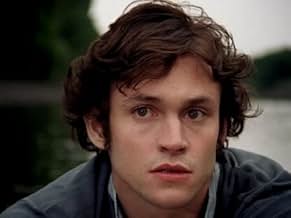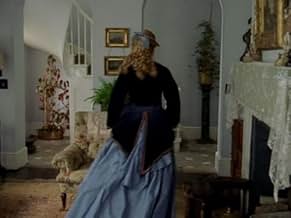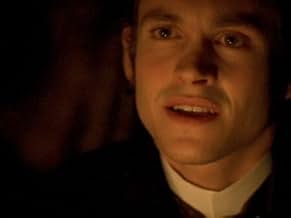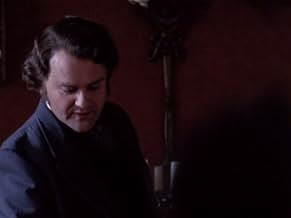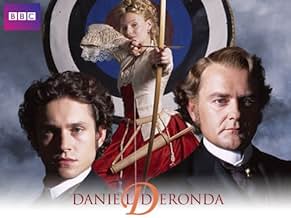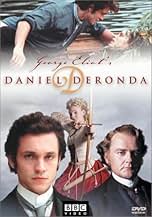Daniel Deronda
- Mini-série télévisée
- 2002
- 53m
ÉVALUATION IMDb
7,2/10
5,4 k
MA NOTE
Gwendolen Harleth est attirée par Daniel Deronda, un gentleman altruiste et intelligent de parents inconnus, mais son propre besoin désespéré de sécurité financière pourrait détruire ses cha... Tout lireGwendolen Harleth est attirée par Daniel Deronda, un gentleman altruiste et intelligent de parents inconnus, mais son propre besoin désespéré de sécurité financière pourrait détruire ses chances de bonheur.Gwendolen Harleth est attirée par Daniel Deronda, un gentleman altruiste et intelligent de parents inconnus, mais son propre besoin désespéré de sécurité financière pourrait détruire ses chances de bonheur.
- A remporté le prix 3 BAFTA Awards
- 5 victoires et 4 nominations au total
Parcourir les épisodes
Avis en vedette
Mary Anne Evans finished writing "Daniel Deronda" in 1876. It was the last of several novels she wrote under the pen name, George Eliot. She was 57 at the time and would live but four more years. Among more than 40 fiction writers of the period, Eliot was one of the great chroniclers of 19th century English society (Georgian-Victorian).
"Deronda" is also the last of Eliot's books to be scripted for a movie. This rendition by the BBC in three parts is excellent. For the fairly recent filming - 2002, the film makers were able to capture the England of the 1870s very well. The cinematography was excellent, as were the script and direction. The acting was first-rate by the entire cast. As some others have mentioned, Hugh Bonneville excelled in his role of a shrewd, mean, heartless "villain," under the guise of a calm, but indifferent gentleman. Romola Garai and Jodhi May were perfect in their roles, and Hugh Dancy was superb in his slight reserve and humility, matching the character in the book. Edward Fox was on the mark in his supporting role, and all the rest of the cast were terrific.
My rating is down one point from a 10 only because of the slight disjointedness in the film. Others have commented on the appearance of two films together, and the difficulty of interweaving them. It wasn't a distraction, but it was noticeable - as though the script should have given us smoother connections between stories. But this is a tremendous film and most enjoyable foray into Victorian England.
I have to give Eliot kudos for one more thing that no one else seemed to comment on. That was the dialog around the table during the Jewish meal. Mordecai said that the Jews would not reach an end to their low esteem until they had a land of their own - in the eastern Mediterranean. What great foresight by a writer 75 years before the worldwide emigration of Jews to the Holy Land after World War II, and the establishment of modern Israel in the late 1940s.
I compliment the BBC for putting Eliot's great books on film, starting in the 1990s. Anglophiles and all of us who enjoy great movies and stories, will cherish these films for years to come. They are a great way to expose the young generation of today with some of the great literature and history of 19th century England.
The world would indeed have loved to have more of Eliot, Charles Dickens, Charlotte Bronte, Jane Austen, Anthony Trollope and Lewis Carroll (Charles Dodgson). Most of them lived a little to a lot longer than the average age of life expectancy at the time. In 1850, that was 40 for males and 42 for females. Trollope (1815-1882) lived to be 67. Eliot (1819-1880) lived to be 61. And Carroll (1822-1898) was 66 when he died. Dickens also beat the average age of death, living to 58 from 1812-1870. But Austen (1775-1817) and Bronte (1816-1855), lived to only 42 and 39, respectively.
"Deronda" is also the last of Eliot's books to be scripted for a movie. This rendition by the BBC in three parts is excellent. For the fairly recent filming - 2002, the film makers were able to capture the England of the 1870s very well. The cinematography was excellent, as were the script and direction. The acting was first-rate by the entire cast. As some others have mentioned, Hugh Bonneville excelled in his role of a shrewd, mean, heartless "villain," under the guise of a calm, but indifferent gentleman. Romola Garai and Jodhi May were perfect in their roles, and Hugh Dancy was superb in his slight reserve and humility, matching the character in the book. Edward Fox was on the mark in his supporting role, and all the rest of the cast were terrific.
My rating is down one point from a 10 only because of the slight disjointedness in the film. Others have commented on the appearance of two films together, and the difficulty of interweaving them. It wasn't a distraction, but it was noticeable - as though the script should have given us smoother connections between stories. But this is a tremendous film and most enjoyable foray into Victorian England.
I have to give Eliot kudos for one more thing that no one else seemed to comment on. That was the dialog around the table during the Jewish meal. Mordecai said that the Jews would not reach an end to their low esteem until they had a land of their own - in the eastern Mediterranean. What great foresight by a writer 75 years before the worldwide emigration of Jews to the Holy Land after World War II, and the establishment of modern Israel in the late 1940s.
I compliment the BBC for putting Eliot's great books on film, starting in the 1990s. Anglophiles and all of us who enjoy great movies and stories, will cherish these films for years to come. They are a great way to expose the young generation of today with some of the great literature and history of 19th century England.
The world would indeed have loved to have more of Eliot, Charles Dickens, Charlotte Bronte, Jane Austen, Anthony Trollope and Lewis Carroll (Charles Dodgson). Most of them lived a little to a lot longer than the average age of life expectancy at the time. In 1850, that was 40 for males and 42 for females. Trollope (1815-1882) lived to be 67. Eliot (1819-1880) lived to be 61. And Carroll (1822-1898) was 66 when he died. Dickens also beat the average age of death, living to 58 from 1812-1870. But Austen (1775-1817) and Bronte (1816-1855), lived to only 42 and 39, respectively.
George Eliot was a truly excellent writer, but 'Daniel Deronda' was perhaps not her best work. This may go some way to mitigating the rather average results that emerge from this adaptation. Intended to be an insightful and complex tale of love, greed, selfishness, prejudice, maturity, and self-knowledge, the film (like the novel) proceeds more like two almost-unconnected stories, neither of which is wildly interesting.
Tying the two plots together is Daniel Deronda, played by Hugh Dancy. Dancy walks his way through, somehow making most of his lines seem redundant. To be fair, acting out a novel that uses extensive narration and introspection can't be easy, but a more experienced actor might have been a better choice to tackle such a tough job. The character of Daniel is a young man on the path of self-discovery, with detours along the way for a bit of romance and a little aimlessness. His relationships with two women form the fabric of the story.
The first tale revolves around the young, pretty, and petty Gwendolen Harleth. Played well, if not spectacularly, by the radiant Romola Garai, she is impetuous and selfish (though usually without intent), thinking that she is and must be the centre of attention. Garai plays her as someone who thinks that she has mastered the world around her, but is in fact nothing more than an indulged child. When her family is virtually ruined financially, she must choose between making a loveless marriage to maintain her high living, or quiet penury in the country. Naturally, she chooses the former. However, what she does not realise is that her suitor, Henleigh Grandcourt, is actually a cold, calculating sadist whose only interest in her is as an item of torment. Grandcourt is played by Hugh Bonneville, the one real stand-out in the production. Bonneville delivers an excellent performance as the deceptive, thoroughly wicked abuser. His Grandcourt is a flint-hearted reptile who first tricks Gwendolen with false kindness and then, when he has her in his grasp, begins to crush her with his cruelty.
Plot two centres on Daniel's relationship with Mirah Lapidoth, a Jewish singer whom he saves from a suicide attempt. Mirah is played by Jodhi May, who is actually rather flat in her delivery. May seems to go in for the "hushed whisper" technique quiet a bit. I suspect the idea was to portray Mirah as a sensitive, troubled woman, but in the end she just seems dull and high-strung. Her search for (and eventual reunion with) her family draws Daniel down a path that he would probably not otherwise have visited, and it has a significant impact on his life.
Good supporting work shores things up a bit, though the screen time is limited. The first comes from Edward Fox as Sir Hugo, Daniel's benefactor, a kindly old man of great wealth who acts as a sort of father to him. The always-excellent Greta Scacchi, looking strikingly haggard in character, is a ghost from Grandcourt's past who comes back to haunt his new bride.
I rate it 6/10.
Tying the two plots together is Daniel Deronda, played by Hugh Dancy. Dancy walks his way through, somehow making most of his lines seem redundant. To be fair, acting out a novel that uses extensive narration and introspection can't be easy, but a more experienced actor might have been a better choice to tackle such a tough job. The character of Daniel is a young man on the path of self-discovery, with detours along the way for a bit of romance and a little aimlessness. His relationships with two women form the fabric of the story.
The first tale revolves around the young, pretty, and petty Gwendolen Harleth. Played well, if not spectacularly, by the radiant Romola Garai, she is impetuous and selfish (though usually without intent), thinking that she is and must be the centre of attention. Garai plays her as someone who thinks that she has mastered the world around her, but is in fact nothing more than an indulged child. When her family is virtually ruined financially, she must choose between making a loveless marriage to maintain her high living, or quiet penury in the country. Naturally, she chooses the former. However, what she does not realise is that her suitor, Henleigh Grandcourt, is actually a cold, calculating sadist whose only interest in her is as an item of torment. Grandcourt is played by Hugh Bonneville, the one real stand-out in the production. Bonneville delivers an excellent performance as the deceptive, thoroughly wicked abuser. His Grandcourt is a flint-hearted reptile who first tricks Gwendolen with false kindness and then, when he has her in his grasp, begins to crush her with his cruelty.
Plot two centres on Daniel's relationship with Mirah Lapidoth, a Jewish singer whom he saves from a suicide attempt. Mirah is played by Jodhi May, who is actually rather flat in her delivery. May seems to go in for the "hushed whisper" technique quiet a bit. I suspect the idea was to portray Mirah as a sensitive, troubled woman, but in the end she just seems dull and high-strung. Her search for (and eventual reunion with) her family draws Daniel down a path that he would probably not otherwise have visited, and it has a significant impact on his life.
Good supporting work shores things up a bit, though the screen time is limited. The first comes from Edward Fox as Sir Hugo, Daniel's benefactor, a kindly old man of great wealth who acts as a sort of father to him. The always-excellent Greta Scacchi, looking strikingly haggard in character, is a ghost from Grandcourt's past who comes back to haunt his new bride.
I rate it 6/10.
The title gave me no clue to the absorbing romantic Victorian drama that was to follow. Said to be George Eliot's last great novel, it exposes in no uncertain manner the pitiful life of the Victorian woman, hardly more than an obedient slave and forced to respond to her husband's demands.
Hugh Bonneville stands out among the excellent cast as the nasty Henleigh Grandcourt who revels in watching women squirm under his aristocratic power and Romola Garai is perfect as Gwendolen who marries him, not for love, but to save her family from economic ruin.
Hugh Dancy in the title role of Daniel has immediate appeal with his handsome good looks touched with both shyness and sadness as he ponders over his past life and the unsolved mystery of his mother's identity.
After Daniel saves a woman from drowning in a river, the story takes an unexpected turn and concentrates on the Jewish problem of a permanent homeland. Daniel is much attracted to the woman he has saved and through his efforts to help her some mysteries of his own life are revealed to him.
The sets, costumes and photography capture exquisitely life in England in the Victorian era. Quite apart from the romantic drama, there is much to ponder over in this story. Thankfully to-day women have gained a degree of independence, though not entirely, and the Jews are still uncertain about the boundaries of their homeland.
I can recommend this film which is in 4 parts. Set aside a full evening to watch the story unfold. It's quite long (205 minutes) but a brilliant production.
Hugh Bonneville stands out among the excellent cast as the nasty Henleigh Grandcourt who revels in watching women squirm under his aristocratic power and Romola Garai is perfect as Gwendolen who marries him, not for love, but to save her family from economic ruin.
Hugh Dancy in the title role of Daniel has immediate appeal with his handsome good looks touched with both shyness and sadness as he ponders over his past life and the unsolved mystery of his mother's identity.
After Daniel saves a woman from drowning in a river, the story takes an unexpected turn and concentrates on the Jewish problem of a permanent homeland. Daniel is much attracted to the woman he has saved and through his efforts to help her some mysteries of his own life are revealed to him.
The sets, costumes and photography capture exquisitely life in England in the Victorian era. Quite apart from the romantic drama, there is much to ponder over in this story. Thankfully to-day women have gained a degree of independence, though not entirely, and the Jews are still uncertain about the boundaries of their homeland.
I can recommend this film which is in 4 parts. Set aside a full evening to watch the story unfold. It's quite long (205 minutes) but a brilliant production.
7=G=
"Daniel Deronda" is a worthy knock-off of George Eliot's novel of the same name which tells of a young Englishman's search for meaning and purpose while enjoying a life of property and leisure. As with most Victorian period costume dramas out of the UK, this film is sumptuously appointed and well represented by the players and places as it meanders through the usual multiplicity of relationships from aristocrat to pauper with a Jewish thread for distinction. "Daniel Deronda" conjures a range of characters from a stoic martinet to a spoiled beauty to an attractive Jewess and beyond with love, greed, envy, guile, and death all swirling around the Deronda character as it manages to sort itself out with a coherent story arc and a more or less happy ending. A "should see" for anyone into Victorian flicks. (B)
The usual lush mini-series adapation from that reliable team, Andrew Davies and the BBC, of a literary property, this time George Eliot's almost forgotten last novel.
Daniel (Hugh Dancy) is the gorgeous if slightly wet boy of mysterious parentage adopted by wealthy amiable old buffer Sir Hugo (Edward Fox). He falls in love with the wrong woman, the beautiful but self-absorbed Gwendolen (Romola Garai). She however is propelled into marriage with ace bounder (and Sir Hugo's heir) Henleigh Grandcourt (Hugh Bonneville). Daniel then becomes interested in Mirah (Johdi May), a promising singer of Jewish background, and through her ailing brother Mordecai (Daniel Evans) the Zionist cause (yes, hotting up as far back as the 1870s). Grandcourt meets a bounder's fate and Gwendolen is now free to marry Daniel, but guess what ?
The costumes are great, the acting impeccable, the photography luminous but the story lacks punch. It is didactic rather than romantic, with metaphorical posters all over the place for women's rights and a homeland for the Jewish people. Hugh Dancy looks right for the part but Daniel is too much of a prig to be very likeable (though he has my sympathy when he discovers that Barbara Hershey, resplendent in a Venetian Palazzo is his mother Greta Scacchi would not have been so bad).
The most engaging characters are Grandcourt the bounder and his sidekick Lush (David Bamber Mr Collins in `Pride and Prejudice') and yet we are meant to despise them both. Gwendolen is sympathetic to the extent she marries Grandcourt to provide financial security for her mother and sisters, but she is a real dork otherwise. Generally the characters lack the panache of say, Trollope's characters in `The Way We Live Now', or Eliot's own in `Middlemarch'. Perhaps Ms Eliot should have quit while she was ahead.
The critics at the time (including Henry James) were baffled by the `Jewish' aspect of the story. It certainly was an outsider's view, yet it rings true today; here Ms Eliot was being prophetic, or was at least aware of the combination of repression, deprivation and myth that could give rise to a successful social movement. In 1876, the year the novel was published, it seemed most unlikely that Palestine would ever become a significant Jewish settlement. Daniel, desperate to find out about his background, finds a cause bigger than himself and eagerly throws himself into it. One has the feeling that Mirah, musically talented though she is, is going to be playing second fiddle.
Anyway, I enjoyed Hugh Bonneville's Grandcourt, a terrific bounder, and David Bamber's Lush (Mr Collins turns bad). And of course, this is Sunday evening stuff, so one mustn't be too picky about the crummy plot and the unsympathetic principals. I usually find myself at this point thinking `I must read the book' (if I haven't already), but this time I don't think I'll bother.
Daniel (Hugh Dancy) is the gorgeous if slightly wet boy of mysterious parentage adopted by wealthy amiable old buffer Sir Hugo (Edward Fox). He falls in love with the wrong woman, the beautiful but self-absorbed Gwendolen (Romola Garai). She however is propelled into marriage with ace bounder (and Sir Hugo's heir) Henleigh Grandcourt (Hugh Bonneville). Daniel then becomes interested in Mirah (Johdi May), a promising singer of Jewish background, and through her ailing brother Mordecai (Daniel Evans) the Zionist cause (yes, hotting up as far back as the 1870s). Grandcourt meets a bounder's fate and Gwendolen is now free to marry Daniel, but guess what ?
The costumes are great, the acting impeccable, the photography luminous but the story lacks punch. It is didactic rather than romantic, with metaphorical posters all over the place for women's rights and a homeland for the Jewish people. Hugh Dancy looks right for the part but Daniel is too much of a prig to be very likeable (though he has my sympathy when he discovers that Barbara Hershey, resplendent in a Venetian Palazzo is his mother Greta Scacchi would not have been so bad).
The most engaging characters are Grandcourt the bounder and his sidekick Lush (David Bamber Mr Collins in `Pride and Prejudice') and yet we are meant to despise them both. Gwendolen is sympathetic to the extent she marries Grandcourt to provide financial security for her mother and sisters, but she is a real dork otherwise. Generally the characters lack the panache of say, Trollope's characters in `The Way We Live Now', or Eliot's own in `Middlemarch'. Perhaps Ms Eliot should have quit while she was ahead.
The critics at the time (including Henry James) were baffled by the `Jewish' aspect of the story. It certainly was an outsider's view, yet it rings true today; here Ms Eliot was being prophetic, or was at least aware of the combination of repression, deprivation and myth that could give rise to a successful social movement. In 1876, the year the novel was published, it seemed most unlikely that Palestine would ever become a significant Jewish settlement. Daniel, desperate to find out about his background, finds a cause bigger than himself and eagerly throws himself into it. One has the feeling that Mirah, musically talented though she is, is going to be playing second fiddle.
Anyway, I enjoyed Hugh Bonneville's Grandcourt, a terrific bounder, and David Bamber's Lush (Mr Collins turns bad). And of course, this is Sunday evening stuff, so one mustn't be too picky about the crummy plot and the unsympathetic principals. I usually find myself at this point thinking `I must read the book' (if I haven't already), but this time I don't think I'll bother.
Le saviez-vous
- AnecdotesThe novel is set in the early 1860s, whereas the adaptation moves the action ahead to 1874, the year that George Eliot began writing the novel.
- GaffesAt Ezra Cohen's store, the baby's left shoe and sock disappear then reappear.
- ConnexionsFeatured in George Eliot: A Scandalous Life (2002)
Meilleurs choix
Connectez-vous pour évaluer et surveiller les recommandations personnalisées
- How many seasons does Daniel Deronda have?Propulsé par Alexa
Détails
- Date de sortie
- Pays d’origine
- Sites officiels
- Langue
- Aussi connu sous le nom de
- 丹尼爾的半生緣
- Lieux de tournage
- Édimbourg, Écosse, Royaume-Uni(Jewish market scenes)
- sociétés de production
- Consultez plus de crédits d'entreprise sur IMDbPro
Contribuer à cette page
Suggérer une modification ou ajouter du contenu manquant

Lacune principale
By what name was Daniel Deronda (2002) officially released in India in English?
Répondre
